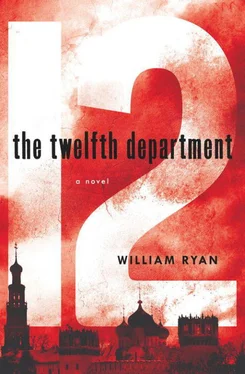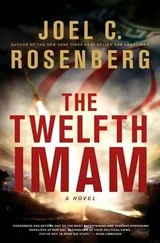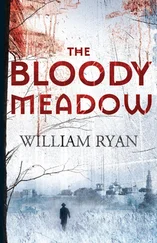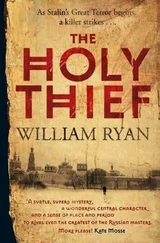“Which in particular?”
“Wasn’t Shtange meant to have been at the institute at the time of Azarov’s death?”
“We don’t have the records for that—they’ve disappeared. We only have Shtange’s word for it—who is dead—and that of the two guards—who have disappeared.”
“And the murder weapon? This only mentions a knife—it says nothing about a scalpel.”
“Yes,” Korolev said, “but remember that the scalpel wound was inconsistent with the others and inflicted after death. It could have been made by someone else. Or it could have been made by him—we think he may be in shock of some form. I’ve questioned him—and well—I don’t think we can rule his story out straightaway. It’s a strange tale and I wouldn’t have picked him as a killer, but then not many people set out to be murderers—it’s more often a result of circumstances than character.”
“Very philosophical.”
“Perhaps. But we need to look into his story, one way or the other.”
“And you’re not concerned that Colonel Zaitsev might have his own agenda?”
Korolev shrugged. “I sat in this room not half an hour ago with a man who told me he killed Dr. Shtange and conspired to kill Professor Azarov. It’s my job to be skeptical, but it’s also my job to investigate likely perpetrators. This fellow is a likely perpetrator.”
“And what will you tell Colonel Rodinov?”
“Exactly what I’ve told you. I didn’t much like being followed around Moscow by Zaitsev’s men, but maybe he had good reasons. It’s not my job to second-guess State Security.”
Dubinkin considered this for a moment, seemingly amused at the idea that someone like Korolev should even contemplate such a possibility.
“No, that’s true.”
“I’ve a question though. People have been telling us that Priudski might have been in close touch with State Security all along. Did you ever look for a file on him?”
Dubinkin shook his head before looking at Korolev suspiciously.
“You’re sending me back to look for more files?”
“We need to find out everything we can about the fellow.” Korolev picked up the photograph of Priudski and slid it across the table. “That’s why Slivka and the uniforms are out showing his pretty face around the locality. And it’s why I’m making my way over to Leadership House to see what else of his story I can confirm.”
“I can’t wait to see the joy on the filing clerks’ faces,” Dubinkin said dryly as he rose.
“They’ll forgive you, I’m sure,” Korolev said. “But if things happened the way Priudski tells it, then it’s a neat ending for us. That’s what we want, isn’t it?”
He wondered if he’d overplayed his hand for a moment, but Dubinkin, after a brief pause, nodded.
“Yes, Korolev,” Dubinkin said. “That’s exactly what we want.”
* * *
After Dubinkin left, Korolev walked over to the window and considered the Chekist. There were certainly other ways that Zaitsev could have known about Korolev’s squeamishness—it was well known in Petrovka, he was sure, and most of the pathologists he dealt with knew he disliked the way they poked and sawed at dead citizens. But the coincidence of Zaitsev referring to his squeamishness the very day after Dubinkin had observed it made him wonder. Could Dubinkin, Rodinov’s man, also be reporting to Zaitsev?
He saw the Chekist appear from the shadow of the building and wait for a tram to pass by—and then out of the shadows cast by the overhanging trees he noticed someone approaching Dubinkin, shaking hands with him. At first he couldn’t be sure who it was, but he thought there was something familiar about the man. They discussed something briefly before going their separate ways.
Korolev let Dubinkin go about his business but kept his eye on the other one, hoping to get a clear view of him. The figure disappeared back into the trees and Korolev thought that was it—that he’d missed him. Then, quite by chance, he caught the briefest of half-glimpses of the fellow through the branches.
He couldn’t be absolutely certain, but it seemed to him it was none other than Svalov, the chubbier of Zaitsev’s watchers.
“Well, well, well,” Korolev found himself muttering.
Thirty minutes later a pensive Korolev parked outside Leadership House and found Priudski’s replacement, Timinov, standing at the entrance wearing a short-sleeved shirt, open at the neck, his face shaded by a flat cap. Korolev envied him, as he sweated, once again, under a gun-covering outer layer.
The doorman tipped the brim of his cap.
“Enjoying the weather, Comrade?” Korolev asked him, offering him a cigarette.
“We’ll miss it in a few months, don’t think we won’t.” The doorman gave him a cheery smile.
“Listen,” Korolev said, lighting their cigarettes. “That fellow Priudski—exactly when was he arrested again?”
“On Tuesday afternoon. At close to six.”
“I thought so. The thing is—I need to know if he was here all that day, before he was arrested.”
“I would think so—I can check.”
“Can you check in a quiet fashion?”
“The schedules are there for us all to see—nothing easier. Are you around for long?”
“An hour or so, maybe longer—I need to talk to one or two of the tenants.”
“I’ll know by then.” He looked around, lowering his voice. “And I’ve something to show you—it may be nothing, but you can be the judge.”
“No better time than now,” Korolev said, and followed him to his office, where the doorman handed him a heavy-looking metal torch.
“You’ll need this.”
“What for? To hit someone with?” Korolev asked, taking it from him and hefting it in his hand.
“No,” Timinov answered with an enigmatic air. “You’ll need it to see what isn’t often seen.”
Korolev followed him, curious now, as they climbed the stairs to the sixth floor. Alongside the lift there was a small, almost invisible door, painted the same color as the wall. Timinov opened it with a key from a large ring.
“What’s this?”
“It’s an access door to the lift shaft. Have a look.”
Korolev peered down into the dark shaft then upward. What light there was came through the gaps between the lift doors on each floor—just enough to show thick cables running the height of the building. Beside the door, in a separate, much smaller space that ran alongside the main lift shaft, there was a narrow ladder.
“What am I looking for?” Korolev asked and, for an answer, Timinov put the torch into his hand.
Sighing, Korolev squeezed through the small door, took a firm hold of a ladder rung with his left hand and with his left foot sought out another, lower rung. His stomach felt hollow, but after he’d tested both rungs and was sure they were secure, he persuaded himself to swing his weight out. And there he was—suspended above a drop that was all the more worrying because of the darkness.
He turned the torch on, pointed it upward and saw a similar door quite a way up and, on each floor in between, a series of grilles that were each about eighteen inches square. There was one just above his head—which meant they probably led into the ceiling spaces between each floor.
“What are those grilles? Some kind of ventilation system?”
“Correct, Comrade Captain,” said Timinov from the open door. For some reason they were both whispering.
Korolev took a deep breath and pointed his torch downward, feeling a lurch of nausea as the beam revealed the drop to the bottom. Or was it the bottom? No, the cables dropped down to a series of heavy wheels, fixed to what must be the roof of the lift. He angled the torch so that it was directed at the fifth floor and saw that the small grille that marked the entrance to the ventilation system was standing slightly ajar.
Читать дальше












